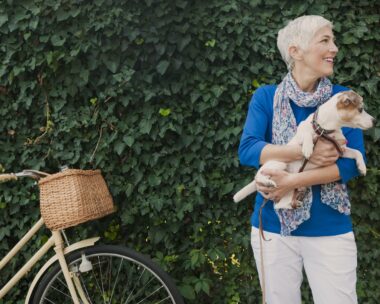In her late 30s, Connor Hartog’s life changed dramatically in ways should could have never predicted. A 10-year relationship ended, she was stood down from her IT job at Qantas, and she moved into a single-person household for the first time in decades. As a result, she discovered all the benefits of living alone.
In an apartment in Redfern, adrift from colleagues who had been like family, she was close to despair. She left Sydney, started to rebuild her life and herself, found a new job with a global software company and was able to buy a house in a northern NSW country town.
“I relish the weekends where I don’t have any commitments so I can be on my own,” she says. “I look forward to thinking, ‘what do I feel like doing today? Do I want to lie on the couch and watch Netflix? Do I want to spend time in the garden? Do I want to catch up with the neighbours and have a drink?’ I don’t have to consult or confirm that it’s okay with anyone else. I can completely make my own decisions and that feels great.”


An empowering choice
Half a century ago, women were financially dependent on men and a spinster was a pitiable creature, some kind of social failure, a person nobody wanted. Since then, there has been a significant swing away from the traditional family towards the rise of the independent woman, living alone.
“For many women, to live alone is an empowering and deliberate choice,” says Dr Catriona Davis-McCabe, President of the Australian Psychological Society. “The solitude of living alone provides an opportunity to know yourself well and become comfortable in your own company. Women who choose to live alone can experience a greater sense of freedom, control and independence because they can develop an environment and a routine that suits them.”
What’s more, “higher divorce and separation rates since the family law reforms of 1976 have produced a population of people liable to live alone,” says Lixia Qu, senior research fellow at the Australian Institute of Family Studies. “Similarly, delays in partnering and the rise of cohabitation, coupled with the relative instability of these relationships, increase the pool of people who may live alone.”
Francine Smith, 41, who has lived solo for 10 years, puts it more forthrightly. “I know dozens of women between 30 and 60 who are just choosing flat out to be indefinitely single and childless,” she says. “They are making that choice because the men around here are useless. And from my lens, all of the women around me who have had to be independent are very strong, very capable, intelligent, compassionate, big contributors to our communities.”
Women living alone, Lixia agrees, “tend to be better educated, more able to support themselves and do what they want compared to older generations.”

The financial pressure of living alone
The truth is, living alone is a luxury. With the housing and cost of living crisis, it is becoming more and more difficult to survive on one income. Single women over 35 are a rapidly growing cohort, but the economy is still geared towards dual income families. Resilient women – who manage their finances, housing, health and wellbeing alone – often struggle with a system that is unprepared for them.
“The narrative that is out there in politics, in terms of thinking about voting demographics, is always talking to the families of Australia,” says Francine, “but there are so many people who say, ‘Well, that is not me’. Policy and decision makers in those industries like real estate and finance are just not keeping up with how quickly the demographic is changing.”
It is harder to secure a lease or a mortgage on a single income. Connor had a financial advisor and found that “because I was a single female, there are certain banks and their products that will not entertain you. They won’t consider you as an applicant because you don’t meet the criteria. They want that two-income family. It is much less volatile or risky.”
She admits she’s familiar with financial pressure. She knows only too well that feeling when “you can see a line of debts that are coming in, and it is only on you”.
“Occasionally,” says Hilarie Dunne, who lives alone, “you think it’d just be nice to have someone who had your back when you had to deal with the tax office, or do your will – all the big things you have to grapple with from time to time. It would be so nice if there was someone to give you a bit of emotional support.”


What about the social aspect?
The Australian Institute of Family Studies has found those living alone have a higher level of connection with people beyond their household than those who live with others.
“I’ve deliberately made a lot of small communities,” says Margie Bauer, 75, who works as a therapist. “In my apartment building I have a community. In my family, in my work, in my interests, I have communities. It stops any feeling of yearning. I look for connection everywhere.”
She says two marriages that didn’t last and “a lot of relationships take away the expectation that you need somebody else to make you happy”.
Social media means people aren’t as isolated when living alone as they once were, and the advantages are myriad. You don’t have to put up with dirty socks, someone commandeering the remote, requiring different temperatures in the house, snoring, having the television on at full volume, liking different food, embarrassing you in public – all the annoyances of a relationship. Many of the women I’ve spoken to, like me, have a cat or a dog – “something living to greet you when you walk in the door,” as one friend explained. And they have a tremendous sense of freedom.
“I can go to bed whenever I like,” says Margie, “I can get up whenever I like – I can get up in the middle of the night without disturbing anybody. I love my independence. I can’t think of one negative thing about living alone.
“You have to recognise that loneliness is something within. I’ve found out that I’m a lot more courageous than I thought, I’m a lot more independent. It’s about respecting and embracing other people. It’s not about feeling that I’m just a person in a house. I always have a reason to get up in the morning. Women are strong and resilient. I have enough … I am enough.”



